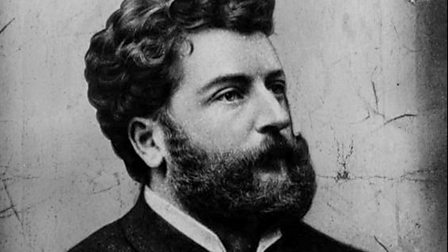Georges Bizet, born Alexandre-César-Léopold Bizet on October 25, 1838, in Paris, France, was a French composer of the Romantic era, best known for his opera “Carmen”. Despite his short life, Bizet left a significant mark on the world of classical music, particularly in opera.
Early Life and Education
Bizet was born into a musical family. His father, Adolphe Armand Bizet, was a singing teacher and composer, and his mother, Aimée Delsarte, was a gifted pianist. Recognizing his prodigious talent early on, Bizet’s parents supported his musical education. At the age of nine, he was admitted to the prestigious Conservatoire de Paris, where he studied under esteemed teachers like Charles Gounod and Fromental Halévy.
During his time at the Conservatoire, Bizet excelled, winning numerous awards including the first prize in solfège and piano. His exceptional skill in composition also earned him the Prix de Rome in 1857, a significant scholarship that allowed him to study in Rome for three years.
Early Career and Works
Bizet’s early career was marked by a series of promising but not widely successful works. His first symphony, “Symphony in C”, written when he was just 17, remained unpublished and unperformed during his lifetime. It wasn’t until 1935 that it was rediscovered and hailed as a masterpiece of youthful exuberance.
During his stay in Rome, Bizet composed “Don Procopio”, an opera buffa that showcased his growing mastery of orchestration and melodic inventiveness. However, it did not gain much attention. On his return to Paris, he struggled to make a name for himself. He composed “Les pêcheurs de perles” (“The Pearl Fishers”) in 1863, an opera that received a lukewarm reception but contained moments of great beauty, including the famous duet “Au fond du temple saint”.
Major Works and “Carmen”
Despite his challenges, Bizet continued to compose, producing works such as “La jolie fille de Perth” (1867) and incidental music for Alphonse Daudet’s play “L’Arlésienne” (1872). However, it was his last opera, “Carmen”, that would secure his legacy.
Premiering on March 3, 1875, at the Opéra-Comique in Paris, “Carmen” was initially met with critical hostility and controversy due to its themes of passion, violence, and tragic realism. The story of a free-spirited gypsy and her doomed love affair with the soldier Don José, based on a novella by Prosper Mérimée, was a stark departure from the light-hearted fare typical of the Opéra-Comique. The boldness of its subject matter and its vibrant music, infused with Spanish influences, eventually won over audiences and critics alike.
Later Life and Death
Tragically, Bizet did not live to see the enduring success of “Carmen”. Exhausted from overwork and disheartened by the initial reception of his magnum opus, he suffered a severe throat ailment. On June 3, 1875, just three months after the premiere of “Carmen”, Georges Bizet died of a heart attack at the age of 36.
Legacy
Despite his untimely death, Bizet’s influence on the world of music has been profound. “Carmen” has become one of the most frequently performed operas worldwide, celebrated for its brilliant orchestration, memorable arias, and deep psychological complexity. His works, characterized by their melodic richness and innovative orchestration, have inspired generations of composers.
In the years following his death, Bizet’s music gained widespread recognition and admiration. “Carmen” was re-evaluated and ultimately hailed as a masterpiece of the opera repertoire. His contributions to orchestral and operatic music are celebrated for their vitality, originality, and emotional depth.
Georges Bizet’s life, though brief, was marked by a remarkable ability to capture the human spirit through music. His enduring works continue to resonate with audiences, affirming his place among the great composers of the Romantic era.


Comments are closed